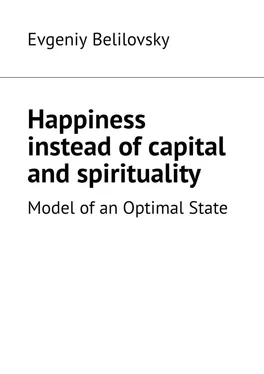First of all, this means that the state will not impose any morality on its citizens. Neither religious postulates, nor the “moral code of the builders of communism”. Such a state would not engage in the education of its citizens at all. It would leave people free to be whatever bastards they want, as long as their bastard nature does not induce them to cause harm to the “physical or economic welfare of any other person”. If that very bastard character is mitigated by the fear of retribution for breaking the law, that would suffice in Heinlein’s state. Another thing is that a vile character can make life difficult for the individual himself in the society. The awareness of such complications can facilitate a change of character, but certainly not the “education of the new man” by the state. For, according to R. Heinlein, there is “grisly unconscious symbiosis between the underworld and the organized churches – for the greatest bulwark of the underworld were always the moral creeds of the churches”.
He confirms this by the practice prevalent in U.S. in the 1930’s, when criminals” were anxious to have blue laws on the books as long as they were not enforced. Illicitness was the thing that made most of their stock in trade valuable, and they knew it.” This was also the reason why “…in every large American city, the gangsters and the preachers, each for his own purpose, supported and elected the same candidates… Sometimes the concatenation is very involved, but in every case you will find at the end the churches attempting to use the state to coerce the citizen into complying with a creed which the churches have been unsuccessful in persuading the citizen to accept without coercion. Wherever that occurs you have a condition which inevitably results in the breeding of a powerful underworld which will seize the local government, and frequently, through control of local political machines, seize state and national governments as well.” And the fact that in today’s Israel the most hardened criminals are brought to trial with a kippah on their heads clearly confirms Heinlein’s conclusion. As does the situation in the former Soviet Union: when Stalinism under the guise of Marxism-Leninism played the role of religion, the bandits were “close” to power, in contrast to the “political criminals” who opposed the regime.
This does not mean a totally negative attitude toward religion. In the early stages of human development, when the general level of knowledge was low, religious attitudes, which were presented as having a divine origin, suppressed barbarism in human relations and contributed to the establishment of at least some order. But times are changing, and religious organizations are increasingly playing a negative role. Although some positive elements in terms of preaching to do good remain, they can be replaced by rational education and, at the same time, by eliminating the damage caused by religious institutes.
The experience of “building communism” clearly showed that using state levers, as before religious levers, to “educate the new man” was counterproductive. As soon as people began to be evaluated by party organizations and labor collectives , not by their actual labor achievements, but by their “moral character,” the proclaimed principle of the socialist state “From each according to his abilities, to each according to his work” was violated. As a result, people felt the obvious injustice of the whole system, which freed them from the need to act justly themselves, which in turn led to widespread deviation from both proclaimed moral requirements and the demands of the law, ultimately leading to the collapse of the entire system.
The collapse accelerated precisely when the command and administration system that formed the backbone of socialism began to transfer real powers to labor collectives within which everything was decided absolutely by personal relationships based on the observance of group morality. The first scientific study, which I actually supervised, concerning sociological problems of production brigades at the Shchelkovsky Pumping Plant in Moscow Region in 1968, showed that the alleged advantage of granting rights to such brigades was in fact an absolute nonsense, because workers distributed wages equally, without any connection with the real achievements of each – “so not to offend anyone”. I must confess that I, and probably others who came to similar conclusions, did not try to emphasize them, because it undermined the slogans of the CPSU (Communist Party of The Soviet Union). And any speeches against the general line not only had no chance of success, but were fraught with danger for their authors. Later, however, a group of comrades submitted to K. U. Chernenko, General Secretary of the CPSU Central Committee, my proposal to include in the CPSU Program an item on combating groupocracy (my term), which was the basis of the corruption that increasingly flourished in Soviet society and eventually ruined it. K. U. Chernenko included this clause in the draft of the Program, but he was already suffering from the consequences of fish poisoning after eating a fish given to him as a “gift” by Soviet Minister of Internal Affairs V. V. Fedorchuk, and after a while he passed away. The new General Secretary M. S. Gorbachev deleted it…
More generally, what is needed is a departure in principle from the standards of behavior that have spilled over from tsarist Russia into the pseudo-socialist Soviet Union and also proved characteristic of Hitler’s Germany. In the remarkable preface to Sebastian Haffner’s book, The Meaning of Hitler . Politics of Crime (Anmerkungen zu Hitler ), the translator Nikita Eliseev writes: “I swear, if schools in Russia still teach “Taras Bulba”, then after the passionate monologue of the son-killer Taras, I would advise teachers to acquaint teenagers with this text (from another book by S. Haffner, Defying Hitler (Geschichte eines Deutschen ), (this is about Hitler’s “military training camps” – Evgeniy Belilovsky) “It is indubitable that a certain kind of happiness thrives in such camps, it is the happiness of comradeship. It was a pleasure to go for a cross-country run together in the morning, and then to go naked into the communal hot showers together, to share the parcels that one or other received from home, to share too the responsibility for misdemeanors that one of your comrades had committed, to help and support one another in a thousand little ways. We trusted one another without reserve in all the actions of the day, and had boyish battles and fights. We were all the same. We floated in a great comforting stream of mutual reliance and gruff familiarity… I, for my part, do not wish to deny it. And yet I know for certain, and emphatically assert, that this very comradeship can become the means for the most terrible dehumanization – and that it has become just that in the hands of the Nazis”. This happened because, according to S. Haffner,
“Comradeship is part of war. Like alcohol, it is one of the great comforters and helpers for people who have to live under unbearable, inhuman conditions… If it is separated from these, if it is exercised only for pleasure and intoxication, for its own sake, it becomes a vice. It makes no difference that it brings a certain happiness. It corrupts and depraves men like no alcohol or opium. It makes them unfit for normal, responsible civilian life”.
This applies not only to Hitlerism, but to the Hitler-Stalinist model of socialism in general. S. Haffner recalls, “Hitler himself called it the “socialization of people. Why should we need all that – socialization of banks and factories” he had said to Rauschning. “What does it matter once I have the people firmly fitted into a discipline from which they cannot escape – we are socializing the people”. And then S. Haffner, who wrote this book during the period of mature socialism , points out: “Surely it is an interesting point that none of the present socialist states confined themselves to the socialization of the means of production. They expended a great deal of effort on also “socializing the people” in other words organizing them collectively, as far as possible, from the cradle to the grave, pressing them into a collective “socialist” way of life, “firmly fitted into a discipline from which they can no longer escape”. Further on, S. Haffner provides practical examples of the similarities between the way of life in the Third Reich and East Germany, which was part of the Soviet bloc.
Читать дальше











